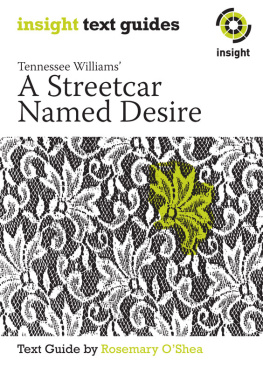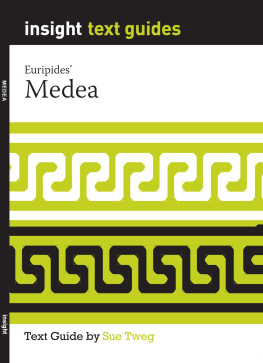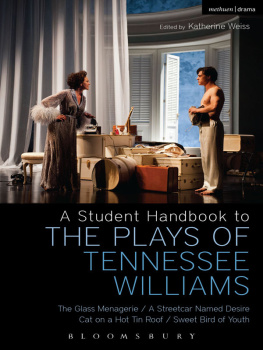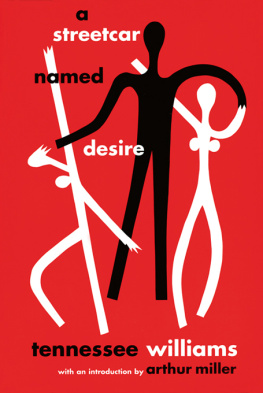Insight Text Guide
Rosemary OShea
A Streetcar Named Desire
Tennessee Williams

Copyright Insight Publications
First published in 2009.
Insight Publications Pty Ltd
89 Wellington Street
St Kilda VIC 3182
Australia
Tel: +61 3 9523 0044
Fax: +61 3 9523 2044
Email:
www.insightpublications.com.au
Copying for educational purposes
The Australian Copyright Act 1968 (the Act) allows a maximum of one chapter or 10% of this book, whichever is the greater, to be copied by any educational institution for its educational purposes provided that the educational institution (or the body that administers it) has given a remuneration notice to Copyright Agency Limited (CAL) under the Act.
For details of the CAL licence for educational institutions contact:
Copyright Agency Limited
Level 15, 233 Castlereagh Street
Sydney NSW 2000 AUSTRALIA
Tel: +61 2 9394 7600
Fax: +61 2 9394 7601
Email:
Copying for other purposes
Except as permitted under the Act (for example, any fair dealing for the purposes of study, research, criticism or review) no part of this book may be reproduced, stored in a retrieval system, or transmitted in any form or by any means without prior written permission. All inquiries should be made to the publisher at the address above.
National Library of Australia Cataloguing-in-Publication entry:
OShea, Rosemary.
Tennessee Williams A streetcar named desire / Rosemary OShea.
1st ed.
9781921088988 (pbk.)
Insight text guides.
Bibliography.
For secondary school age.
Williams, Tennessee, 19111983.
Streetcar named desire--Criticism, Textual.
812.54
contents
CHARACTER MAP
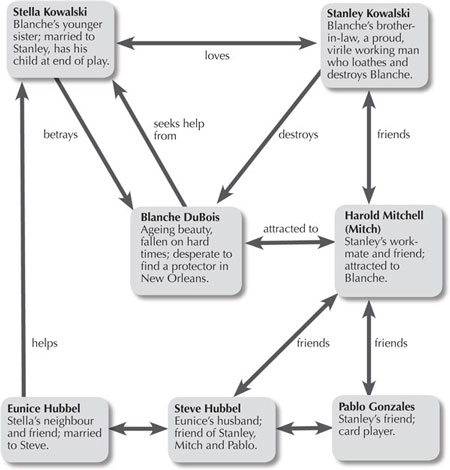
OVERVIEW
About the author
Thomas Lanier Williams was born on 26 March 1911, in Mississippi, USA. He was a shy child who endured bouts of serious illness and always suffered from the feeling of being an outsider. His family life was often unhappy. Williams mother was a difficult woman with fantasies of being an aristocratic Southerner and his father, a travelling salesman for a shoe manufacturer, favoured Thomas younger brother, Dakin, over the other children. His sister, Rose, suffered from mental illness and was confined to hospitals and institutions for most of her adult life.
During the 1930s Depression, Williams entered university in Missouri where his Southern accent earned him the nickname Tennessee. He could not afford to stay at university and left to take a job in a shoe factory, although he later returned to his studies, graduating from the University of Iowa.
Williams was a prolific writer of fiction, essays, poems and more than thirty plays. His earliest essays and short stories were published when he was a teenager and his first play, Cairo, Shanghai, Bombay, was produced in 1937, when he was at university. During World War II, American Blues was produced and towards the end of the war, in 1944, Williams had great success with The Glass Menagerie, which contains many autobiographical elements and is often thought to be his greatest work. However, it was for A Streetcar Named Desire that Williams received the Pulitzer Prize in 1948: a prize he later won again, in 1955 for Cat on a Hot Tin Roof. Williams became famous internationally in the 1950s when several of his plays, including A Streetcar Named Desire, were made into successful films featuring renowned Hollywood stars. Although some later works did not show the quality of his earlier writing, others, such as Suddenly Last Summer, Night of the Iguana and Sweet Bird of Youth, were acclaimed and also made into films.
Williams drew on his own experiences to create works that give a distinctive voice to the postCivil War South (that is, during the late 1800s and early 1900s). The genteel but decaying society he brings to life in his plays was fast disappearing at the time during which he was writing. His plays explore sexual frustration and suppressed violence, themes that were shocking to audiences at the time. Many of his characters suffer from loneliness, often to the point of breakdown. Brutal and fragile elements counterbalance each other in many of the plays. Williams own struggle as a homosexual man in a disapproving society; his bouts of depression; and his dependence on alcohol, barbiturates and amphetamines are reflected in the isolation suffered by the outcasts in his plays. Tennessee Williams died on 24 February 1983 at the Hotel Elyse in New York.
Synopsis
Blanche DuBois arrives at her sister Stellas home, on the edge of the French Quarter of New Orleans, hoping to stay. She is shocked by the seedy area and the shabby little apartment and has to drink several whiskies before she can face Stella, who returns from watching her husband, Stanley Kowalski, at the bowling alley. Blanche expresses dismay at Stellas poor circumstances but Stella claims to be happy and fulfilled in her marriage and way of life.
Stanleys return home unsettles Blanche, who finds him crude and vulgar. He is initially offhand about her arrival but becomes suspicious when Stella tells him that Blanche has confessed that their family home, the beautiful Belle Reve, has been lost to pay for the debts and funerals of their older relatives. Stanley accuses Blanche of trying to cheat Stella, and by extension himself, out of the inheritance. When he seizes her papers to investigate, Blanche is distressed that he has snatched some letters and poems written by her husband, who died as a young man.
Stanley is drinking and playing cards with his friends when Stella and Blanche return from an outing later that evening. Blanche is pleased by the quiet, polite Mitch, who lives with his sick mother and is a workmate of Stanleys. Stanley becomes more aggressive as he gets drunk, throwing a radio out of the window and finally hitting Stella. Blanche is horrified by his violence and takes Stella to her friend Eunices apartment upstairs. Stanley sobers up enough to howl in anguish for Stella outside Eunices window. Stella comes slowly downstairs, they kiss and Stanley carries her into their home.
Blanche is appalled. The next morning she tries to convince Stella to leave and set up home with her, vowing that a rich admirer of hers will finance them. But Stella, fiercely loyal to her husband, claims that the occasional rough treatment is part of the passionate love they share. Tension grows between Stanley and Blanche, and Mitch and Blanche begin a tentative relationship. She tells him about her brief marriage, and confides that when she found that her husband was homosexual she expressed her disgust and he committed suicide. Stanley, meanwhile, has been checking up on Blanche. He has found out about her promiscuous past: her liaisons with soldiers from the local camp, her prostitution at a hotel in her home town, Laurel, and her seduction of a student an event which led to her being virtually driven out of Laurel. Blanche is horrified to learn that Stanley has told all this to Mitch. Stanley presents Blanche with a birthday present a one-way ticket back to Laurel just as Stella goes into labour.
Blanche is alone in the apartment later that night when Mitch arrives, drunk and angry. Blanche asks for pity and understanding, telling him that her actions came from grief and guilt at her husbands death. He tries to rape her but stumbles out when she calls fire! (p.207). She is less successful at discouraging Stanley. He returns from the hospital and turns aggressively on Blanche who has retreated into a make-believe world. Although she tries to fend him off with a broken bottle, Stanley rapes Blanche.
Next page
